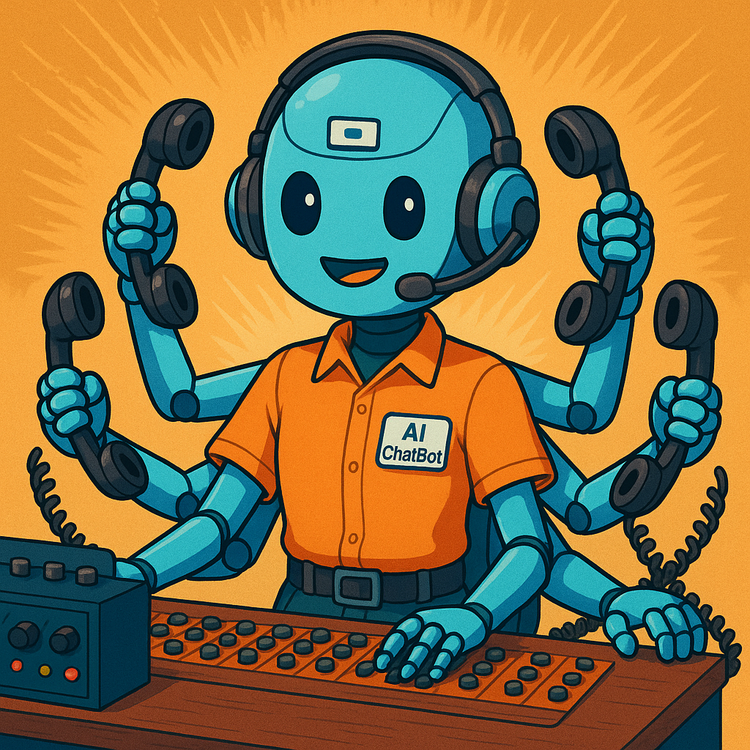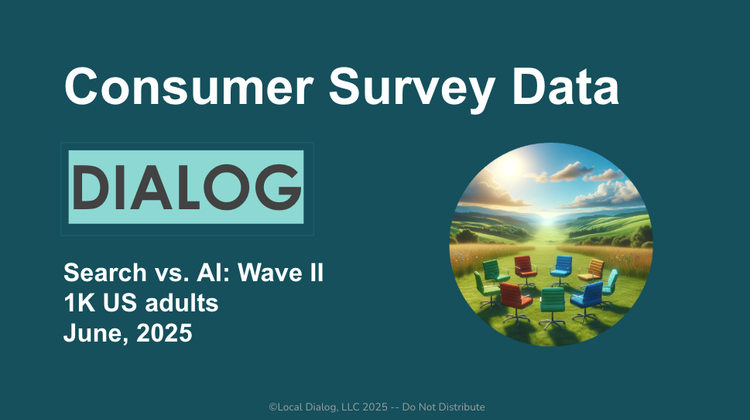How AI Is Changing Dentistry: Dr. Cooper Differding Interview

Dentistry is a profession that doesn’t immediately come to mind when thinking about AI. But AI is as relevant to the dental industry as any other we’re finding.
Dr. Cooper Differding
For years I’ve had an ongoing conversation about technology and digital marketing with my neighborhood dentist. Some of you may remember earlier references and anecdotes about “Dan the Dentist” at conferences and in informal discussions. Others may remember an interview I did with him a number of years ago about how technology was changing the dental industry.
Dan the Dentist recently retired and turned his practice over to Dr. Cooper Differding or “Coop the Dentist.” (This is similar to what’s happening with local businesses all over the country as “Boomers” exit and younger operators take over.) I interviewed Dr. Differding, I'll call him Dr. Coop for short, in July about how the profession is changing. Among other things, we explored the potentially transformative impact of AI. We focused on how technology advancements are reshaping administrative processes, diagnostic capabilities and patient education. We also discussed related ethical issues.
Before we dive in, some context is in order.
A $450 Billion Industry
Dentistry in the US will generate roughly $200 billion in 2024, expanding at a compound annual growth rate (CAGR) of about 3.3%. Globally, it’s a $450 billion industry, which may reach $600 billion by 2030. The current $200 billion US market is driven by just over 4% of the world’s population. That means just $250 billion is generated by the remaining 96%. That translates to roughly $600 in annual spending per capita in the US and an average of just $31 in the rest of the world. Kind of staggering when you do the math.
At the heart of the dental industry today are an estimated 200,000 licensed practitioners in the US and some 1.5 - 2.0 million internationally. Globally, the demand for dentistry is accelerating, driven by huge markets such as China and India. Given the size, scale, revenue and overall importance of dentistry, it’s no surprise that we’re seeing considerable technological innovation in both practice management and clinical dentistry.
Boosting Administrative Efficiency
In recent years, SaaS practice management systems have significantly improved dental-administrative operations. Dr. Coop told me that cloud-based systems like Dentrix Ascend enable streamlined patient reminders, offer customized communication, and more efficient recall management (encouraging regular patient visits). These systems help prevent missed appointments, maintaining patient visits and practice revenue. Automated scheduling and follow-ups also reduce much of the tedium and manual administrative work, freeing up time for staff to focus on more important tasks and patient care.
Keep in mind that if patients routinely miss appointments or delay cleanings – 80% people have some level of dental anxiety – the practice will be impacted. A missed appointment is a loss of revenue that can never be recaptured; appointments are “perishable.” It’s no surprise then that software providers have pushed aggressively into the patient engagement arena. A couple fewer missed appointments per month makes for a very easy ROI calculation.
Improved Dental Diagnostics
AI's role in patient diagnostics is very promising. "AI can detect cavities in their infancy by analyzing digital images," explained Dr. Coop. Early detection can potentially save patients from more invasive (read: painful) procedures down the road. Dr. Coop added that much of dentistry today is reactive (i.e., "I just broke a tooth") and that early and predictive detection, which AI is enabling with mouth scanning and image interpretation, could dramatically change that.
Various technology and AI tools are also making possible more real-time collaboration among specialists, which can improve treatment planning. Dr. Coop emphasized that "viewing the same material live during consultations" improves specialist communication and ultimately patient outcomes.
Better Patient Education
Though perhaps not obvious, AI also has a role to play in patient education. For decades the dental industry has been trying to educate the public about the benefits of healthy oral hygiene. Dr. Coop believes advanced imaging and AI tools will play a crucial role in patient education going forward. By being able to digitally manipulate and filter images, "in a way that allows patients to understand their condition better," dentists can better explain treatment and prevention more.
This can build greater trust and ensure patients are better-informed about their dental health. But this also carries the risk of "over-treatment," which some dentists definitely engage in. So the tools cut both ways.
Ethical Concern: Profit over Patients
The examples above showcase AI's potential to improve dental practice management and patient care. However, there are some ethical concerns, suggested by the over-treatment possibility. As much as he touted the benefits of new software tools, Dr. Coop also warned about the temptation and risk of over-reliance on AI, which could result in treatment recommendations driven by profit rather than patient needs. "The profit-driven side of AI could lead to unnecessary treatments, which is a concern," he cautioned.
Ensuring that AI tools are used responsibly is critical for maintaining patient trust and delivering quality care. As a case-in-point, the largest dental product supplier in North America, Henry Schein (e.g., gauze pads, lidocaine), also owns the most widely used practice management software, Dentrix. The risk here is that the AI gets trained or “tuned” in a way that over-recommends certain treatments so that more products at higher value are pushed through the supply chain. The possibility is worrisome and something to be mindful of as these tools gain further adoption.
AI-Powered Vendors
With the growth of dentistry around the world, the market opportunity for additional technology and AI is considerable. While Dr. Coop is a user of Henry Schein’s Dentrix platform, there will be other players increasingly competing for his business. Here are just a few of them (the claims are from the vendors rather than third parties).
Clinical Dentistry:
- VideaHealth has gained prominence by securing one of the largest FDA clearances* for dental AI tools, with over 30 AI algorithms. These tools are designed for detection of common dental diseases, including periapical radiolucencies, calculus, and pediatric caries detection. (Funding: $26 million from Spark Capital and others.)
- Overjet’s AI technology is FDA-cleared for detecting, outlining and quantifying oral diseases in x-rays. It annotates dental x-rays with precise details, helping clinicians and educators. Overjet is used in dental schools like Western University College of Dental Medicine and the University of Florida College of Dentistry, where it has reportedly improved students' cavity detection skills. (Funding: $42.5 million raised from General Catalyst and Insight Partners and others.)
- HelloPearl Pearl's Second Opinion software integrates with Curve Dental's SuperHero practice management system to offer AI-driven disease detection. This collaboration brings FDA-cleared clinical AI tools to a wide user base, enhancing the accuracy and efficiency of dental diagnostics and treatment planning. (Funding: $91 million from Alpha Partners and Left Lane Capital and others.)
- 3Shape is known for AI-driven custom crown designs and surgical planning tools. Their latest updates include AI-assisted identification of anatomical landmarks and pathologies, which improve the accuracy of surgical planning and provide visual support for clinician-patient communication.
Practice management:
- Curve Dental is a cloud-based practice management system that integrates AI to streamline dental practice management, including patient scheduling, treatment planning, and billing. Curve Dental’s platform includes features like automated appointment reminders and real-time patient data access. (Funding: $45 million raised from Battery Ventures and others.)
- Dental Intelligence, now part of Dental Whale, uses AI to analyze practice data and provide insights. It helps dental practices understand patient behaviors, optimize scheduling and improve case acceptance rates. The platform also offers features for revenue cycle management and patient engagement. (Funding: $34 million.)
The integration of AI and advanced technology into dental practices will boost efficiency, likely improve diagnostics and engage patients in more effective ways. It is essential, however, to navigate these changes with a focus on ethical practices and ensure that patient care remains the top priority.
Accordingly, Dr. Coop’s insights underscore the importance of balancing technological innovation with responsible, patient-centered care. If successful, this will pave the way for a more advanced, profitable and trustworthy dental industry.
*FDA clearance is a lower standard than FDA approval.
This is part of our ongoing series of interviews with local business owners and operators.





